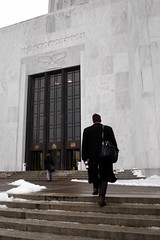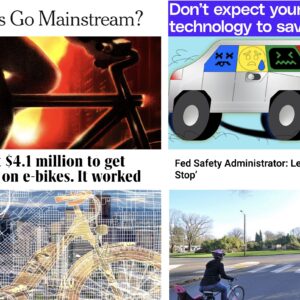Tomorrow I’ll make my first trip down to Salem this session — and what a full day it’s shaping up to be.
My day will start with a meeting of the Oregon Transportation Commission (OTC). The OTC is the five-person, governor-appointed cabinet that sets transportation policy for the Oregon Department of Transportation (ODOT). (I introduced you to them a few weeks ago).
At their meeting tomorrow, the OTC will dole out $102 million for transportation projects — their second installment of stimulus funds. Their first phase of stimulus funding decisions (made earlier this month) included only one bike project and did not include any transit funding.
This second phase is being closely watched by advocacy groups that are in favor of a balanced transportation system. They say ODOT and the OTC have focused way too much on highway widening and re-paving projects. Non-profit group 1000 Friends of Oregon teamed with Smart Growth America to publish a report that brings attention to their concerns and offers a new way forward.
That report, titled, Spending the Stimulus: How Oregon Can Put Thousands Back to Work & Jump-start a 21st Century Transportation System (PDF, 3mb) says Oregon can create jobs and create strong communities by making investments in: maintenance of the existing system, transit and rail projects, and bike and pedestrian facilities. Here’s snip from their report:
“At a time when driving is declining, transit ridership is surging, and repair backlogs are growing, heavy investment in new highways is unlikely to be the best investment in most places.”
After the OTC meeting, I’ll head over to the state capitol building for a full plate of hearings on proposed bike-related legislation. I’ll watch Karl Rohde of the Bicycle Transportation Alliance (BTA) go in front of the House Transportation Committee as they hear about, discuss, and perhaps vote on a variety of bills.
The big one up for hearing tomorrow is HB 2690, a.k.a. the Idaho Stop Law (full bill text). This is the law proposal brought forward by the BTA that would allow bicycle operators to go through stop-signs without stopping when conditions are safe (and after they’ve yielded to all other traffic).
I spoke with the BTA’s Karl Rohde and to lawyer Ray Thomas (who’s on the BTA’s legislative committee) about this today. They both seemed cautiously optimistic about its chances tomorrow. This bill is fraught with risk for the BTA. Not everyone that bikes sees the value in it and anti-bike folks think it will only encourage crazy scofflaws to be even more, well, scofflaw-ish. Perhaps aware of this wide spectrum of opinion about the idea, the BTA has been quiet. They have not sent out widespread action alerts or tried to rally their members in support of the bill.
The risk with that strategy is that legislators on the Transportation Committee won’t hear from their constituents about it. With a law like this, that would fundamentally change how bikes legally treat stop signs, some politicians need to hear support before voting “yes”. We’ll see what happens tomorrow. It should be interesting.
Also up at the hearing is HB 2971 (text). This bill would increase the “allocation of State Highway Fund moneys for footpaths and bicycle trails” from its existing 1% to 2%.
After the hearing at the Transportation Committee, I’ll join Rohde and Ray Thomas at a meeting with key legislators to discuss the Vehicular Homicide bill (HB 3399, text). Introduced by the widow of Tim O’Donnell, this bill would make homicide of another road user while operating a vehicle punishable by a maximum of five years in prison, $125,000 fine, or both. This law would only be triggered if the vehicle operator was driving without a license, without insurance, and was driving impaired.
Stay tuned for reports from Salem.








“This law would only be triggered if the vehicle operator was driving without a license, without insurance, and was driving impaired.”
Is that an AND or OR statement in the law? I didn’t quite understand it after reading the text of the bill.
It’s an AND statement. in other words, all of those conditions must be met in order to trigger the Veh. Homicide crime.
Thanks. Wow. That’s pretty specific. Certainly seemed Krieger either didn’t understand it or purposely ignored it when he was arguing against the bill (just saw Veer! last week).
So the Veh. Homicide bill still isn’t law then. I didn’t think it was, but Veer! had me thinking it was. So what happened in Veer!? Was it simply passing committee?
John,
i think you’re confusing the Vehicular Homicide bill that’s being discussed this session with the Vulnerable Roadway Users bill that became law in 2007 and that is the subject of Veer.
an easy mistake to make ;-).
A couple of quibbles for you…
HB 2971 actually increases the contribution from 1% to 2%, not merely 1.5%. It’s separate from HB 2120, the Governor’s JTA, which does include the 1.5% figure.
Also, in the previous round of stimulus funding, the Union St. Railroad Bridge in Salem, a bike/ped project, received $3.5M in TE funds for lead abatement. Maybe not very sexy, but still a second bike/ped project – so there were in fact twice as many bike projects in the first round! There still wasn’t enough emphasis on transit and bike/ped infrastructure, but maybe the initial slice was a little better than your initial report suggested.
There is an unbelievably horrible opinion article posted at the Oregonian right now about the Idaho stop law.
The author is entirely uninformed about what the bill does and the issues involved.
And as expected the piece drawin false equivalence between the Idaho stop bill and the Krieger bill. (They’re both about bike, controvesial, and therefore the same).
Idiocy: http://www.oregonlive.com/politics/index.ssf/2009/03/roll_on_bikes_roll_on_through.html
Most bike advocates I know are against the Idaho stop.
The oly way the Idaho Bike Bill will get passed here is if there is about a year’s worth of informative, education discussions in the public forum with a lot of supporting data gleaned from Idaho showing how it would pan out here. Even then, there will be lots of negative knee jerkers blasting it on the airwaves, etc. Good luck!
Frank-
If they were not wearing the official ‘Bike Advocate’ stamp issued by the state, they are not really bike advocates. As such, their opinion is just as valid as yours and mine.
I am for the Idaho stop law as it is sensible. I am also against anyone who calls themselves a bike advocate, as they are generally full of cr@p and do not represent anyone but themselves.
Ok,
People who work for bicycle advocacy organizations. That better?
Many people would say that not allowing bicycles on high speed roads primarily used by automobiles is “sensible.”
I would be careful about making laws that take away someone’s responsibilities as it makes it easier for someone to do away with your rights. I do not own a car and ride 5,000 miles per year. Stopping at a stop sign is no big deal. It might add 30 seconds to a trip across town.
What % of automobile drivers do you suspect would ever learn that the law had been changed in Oregon?
thanks for the clarification Eric. I’ll double check and made edits as necessary. By the way, great job in tracking the Salem action on your blog.
Also, I hear you about TE funds, and OTC members have pointed that out to me as well. But as I see it, TE funds are a separate animal and they are much more likely to go to bike projects by the nature of the law that governs them. My reporting has had to do with non-TE stimulus decisions.
“i think you’re confusing the Vehicular Homicide bill that’s being discussed this session with the Vulnerable Roadway Users bill that became law in 2007 and that is the subject of Veer.”
Indeed I was confusing those two. Thanks for the clarification.